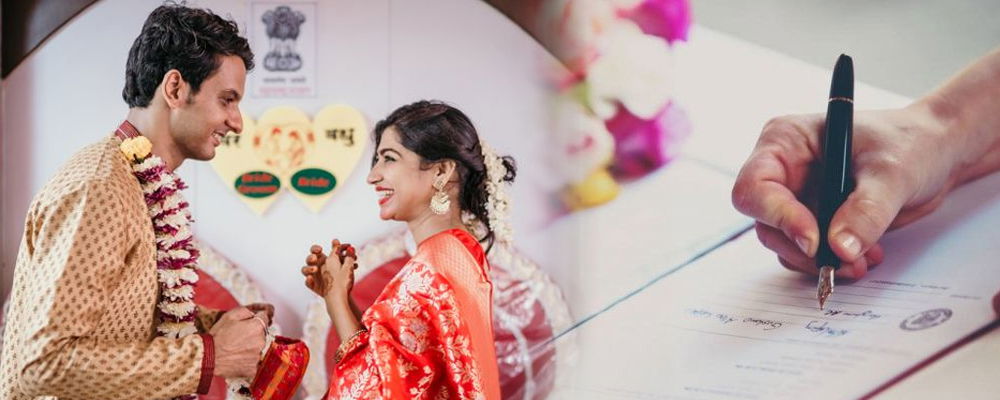Why Court Marriage Is Easy In India?
A court marriage takes place when a man and a woman are legally allowed to wed, regardless of their social background or status in front of a judge, a marriage official, and three attendees who shall act as witnesses. Under the Special Marriage Act of 1954, court marriages are performed in India. Court Marriage in Delhi can be easily solemnised once the registration process is initiated.
Essential Conditions for Court Marriage:
- Both the bride and the groom need to be at least 18 and 21 years old.
- The parties should not be insane or mentally ill.
- They should be capable of giving valid legal consent to get married.
- They shouldn't be in a banned relationship to the extent that it would prevent them from getting married. When a tradition controlling at least one of the parties authorises the union of the parties, a marriage may be solemnised irrespective of whether the marriage falls within the range of prohibited unions.
- At the time of marriage, neither party should be currently married.
Required Documents:
- The application should have both parties' signatures.
- Verification of the parties' birth dates.
- For both parties, residential evidence.
- Two photographs of the bride and husband that are the size of a passport.
- A divorce or death certificate if the individuals had a previous marriage
- Proof of payment of fees associated with the District Court application form.
- A statement from both parties stating that their relationship does not fall within the Special Marriage Act's definition of a prohibited connection.
Witness For Court Marriage:
Anyone can be a witness to Court Marriage, who knows the couple including family members, friends of the couple, coworkers, and friends. Additionally, a court marriage must be solemnised in front of three witnesses.
Documents of Witnesses:
- The most crucial document to present to the marriage officer is the witness's residential verification.
- The witness must also give their PAN card to the marriage officer.
- Three witnesses to the marriage must each provide a passport-size photo.
- The witness's identification document, such as a driver's licence or an Aadhar card.
Court Marriage Fees:
Different states have different court marriage fees. The average cost of court marriage is between Rs. 500 and Rs. 1000. However, it is always advisable to double-check the fees before submitting an online application for a court marriage because each state establishes its own rules and regulations and specifies its own fee structure for the ceremony. The Court Marriage registration form must be filled out and the court marriage documents and fees must be attached.
Procedure For Court Marriage:
Notice: The district marriage official must first be notified by the parties. The parties to the marriage must give written notice of their desire to wed to the marriage official in the manner outlined in the second schedule.
Publication of Notice: After publishing the notice, the marriage officer must post it in a prominent location in his office; any form of opposition must wait 30 days before being filed. In the absence of any opposition, the marriage official may perform the ceremony.
Objection to Marriage: Anyone may oppose the marriage under Section 7 if they believe it would violate any of the provisions outlined in Section 4 of the act within the 30-day period. However, a legal argument should be made rather than a personal one. After investigation, if an objection does not prevent the marriage from being solemnised, the Marriage Officer shall conduct the marriage.
The declaration: In a court marriage, three witnesses are necessary before the marriage is solemnised. It is necessary for both spouses and three witnesses to sign and declare using the Third Schedule's designated form in front of the marriage officer.
Place of Solemnisation: According to Section 12 of the Special Marriage Act, a court marriage may be solemnised anywhere that is reasonably close to the marriage registrar's office. The process of paying the court marriage fees is included in the online application for court marriage.
Certificate of Marriage: The marriage official will issue the marriage certificate once all of these procedures have been completed. And both parties as well as three witnesses, must sign this certificate. A certificate of this nature is proof sufficient of judicial marriage.
Advantages of Court Marriage:
- One practical aspect of the Indian Court Marriage Process is that it is far simpler than traditional marriages, starting with the completion of an online application for court marriage and ending with the registration of court marriage.
- It is more affordable and simpler.
- It avoids the high costs associated with wedding ceremonies and traditions.
- The marriage may be solemnised in any manner desired by the contracting parties.
- It guarantees both parties' agreement.
- Both parties to a marriage voluntarily sign the marriage licence.
Visit us: - https://www.leadindia.law
Call Us: - +91-8800788535
Email: care@leadindia.law
YouTube: - https://www.youtube.com/c/LeadIndiaLawAssociates
Facebook: - https://www.facebook.com/leadindialaw
LinkedIn: - https://www.linkedin.com/company/76353439
Twitter: - https://twitter.com/leadindialaw
Pinterest: - https://in.pinterest.com/lawleadindia
Instagram: -https://www.instagram.com/leadindialawofficial
Court Marriage, Court Marriage Process, Court Marriage in Delhi

